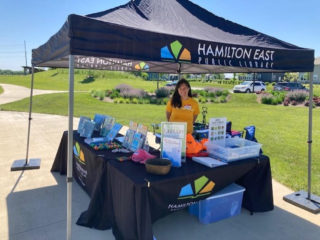SEED LIBRARY GROWS COMMUNITY IN HAMILTON COUNTY
Hidden between the books at the Hamilton East Public Library is an unassuming treasure trove for Gardners that lays against the eastern wall. The packets appear to be just as they are, small opaque baggies containing a few seeds in them, but to the local gardeners who know about the Seed Library program, they represent so much more than seeds.
The Seed Library at HEPL was planted in Brian Howell, the Director of Community and Staff Engagement at the HEPL’s head while looking for new ways that the library could go beyond the books in connecting to the local community.
In 2017, the Carmel Clay Public Library had recently opened the doors of its own Seed Library, and had seen success within its community, inspiring Howell to bring it to his own.
“Brad Howell was the head of the whole effort, who first had the idea that this would be something that the people in our community would be interested in,” one of HEPL’s resident Master Gardeners, Kathy Sasseman said. “It happened in a couple libraries across the country but it wasn’t too wide-spread at all, he brought the ideas up to a couple of who are gardeners and Master Gardeners and wanted to try it out for our community.”
With the collaboration of Friends of the Hamilton East Public Library and the Master Gardeners of Hamilton County, the HEPL’s very own Seed Library opened its doors to the community in 2017 and has been a growing success since.
“What has been really big is families’ responses,” Howell said. “People say ‘We were looking for fun things to do with our kids in the summer and these seeds have been the best things in the world’…They take pictures and post things on social media and all of that, for me as a father of 4 kids, has been one of the best parts.”

Above: Hamilton East Public Library Community Engagement Coordinator Julia Welzen promotes the Seed Library at an outreach event. Photo contributed by the Hamilton East Public Library. Caption by Lauren Kopka.
Seed libraries operate by library patrons “borrowing” the pre-packaged seeds from their local library to be planted and enjoyed at home and in some cases patrons “return” seeds at the end of the season to replenish the supply. Seed libraries exist nationally and there are about 660 operating across the US as of 2018.
At the HEPL, donated seeds are then vetted by staff and placed out in the Seed Library alongside the seeds the library purchased from official seed suppliers.
“Our Master Gardeners help us package the seeds, they don’t buy the seeds,” Howell said. “There are about four or five seed vendors, one on the west coast, one on the east coast and a couple in the Midwest, in fact Urban Farmers in Westfield is one of them It used to be that we were getting funded through grants and stuff like that but now the library has seen how popular it has become and so now in the same way we buy books, we buy seeds.”
Community engagement is a pillar of the Seed Library and efforts are made by the staff to go out into the community and get more people involved in gardening. One way they do this is by focussing on local schools and providing them with seeds.
“What’s really fun is working with the schools, trying to get it into the hands of teachers and teachers who were not gardeners before are gardeners now,” Howell said. “What do teachers do? They pass down their love of what they’re doing to the kids, so now elementary students are also becoming gardeners as well…It’s been fun to see all the community groups, like girl scouts, reaching out to us and growing the relationship.”
In the beginning of the program, the HEPL Seed Library was composed of a collection of 30 to 40 open-pollinated and heirloom seeds (seeds existing for more than 20 years and openly pollinated) for the community to browse, but local demand contributed to this number nearly tripling over the last five years to keep up with demand. The Library now includes 140 different varieties of herbs, vegetables and flowers. It runs March 1st to October. Each library card holder is limited to 20 packets per year and is done on the honor system.
“People around here have really taken to [the program],” Sasseman said. “It’s something that grows families together, I’ve heard families talk about the positive impact of them-it’s like a STEM program for families.”
Libraries from other communities have come to observe the thriving Seed Libraries at the Fishers and Noblesville locations, like Howell and his team did not so long ago.
“Westfield has visited us, other libraries have [too],” Sasseman said. “We’ve helped other libraries design and get [the program] started. People see how much the patrons like it…it’s achieved our goal that’s for sure.”

